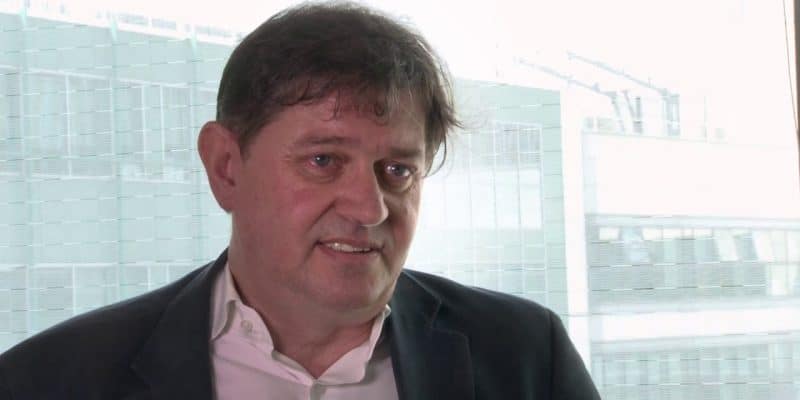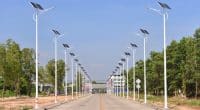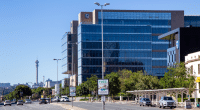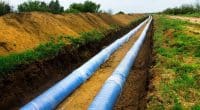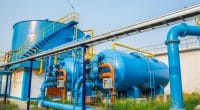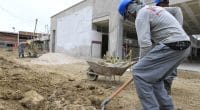On the sidelines of the Committee of African Cities which closed on September 20, 2023 in France, the Managing Director of Setec Afrique, a subsidiary of Technical and economic research company (SETEC), gave an interview to AFRIK 21. Alain Bloch looks back at the challenges facing the continent on a daily basis. From waste management to mobility and atmospheric pollution, the French industrialist explores the work his teams are doing on urban infrastructures adapted to demographic growth and climate change.
On the sidelines of the Committee of African Cities which closed on September 20, 2023 in France, the Managing Director of Setec Afrique, a subsidiary of Technical and economic research company (SETEC), gave an interview to AFRIK 21. Alain Bloch looks back at the challenges facing the continent on a daily basis. From waste management to mobility and atmospheric pollution, the French industrialist explores the work his teams are doing on urban infrastructures adapted to demographic growth and climate change.
Benoit-Ivan Wansi: Why did you create SETEC Afrique in 2020? And how many subsidiaries do you have on the continent?
Alain Bloch: SETEC has been working in Africa for 50 years, but the creation of Setec Afrique was prompted by a number of factors: – Sub-Saharan Africa has enormous needs in areas where Setec has particular expertise, such as transport and water. – We want to create high-level African engineering with local personnel trained in our methods. – This ambition requires an appropriate organisation to generate work locally, which will be carried out entirely on site or in collaboration with the Group’s French companies.
We now have seven subsidiaries, in Ivory Coast, Senegal, Cameroon, Gabon, Congo, Benin and Madagascar, as well as a branch in Guinea.
What is SETEC Afrique’s turnover? Do you work with partners, in particular investment companies and groups such as Meridiam?
SETEC Afrique’s turnover in 2022 is €8.5 million and should exceed €14 million in 2023. These figures represent around 50% of the Group’s total business in sub-Saharan Africa, with strong synergies between SETEC Afrique and the other companies in the Group. We work with both the public sector (governments, public companies) and the private sector. One of our major clients is the Meridiam fund, with whom we are working on several projects, notably in Senegal, Gabon and, before the coup d’état, in Burkina Faso, where we were working on the new Donsin international airport (north-east of the capital Ouagadougou). We also worked for Meridiam and Vinci in Kenya as part of a public-private partnership (PPP). We also work with other investment funds such as Africa50, and with builders such as Eiffage, NGE (civil engineering), Colas (a subsidiary of the French Bouygues group), Razel and Sogea Satom. In total, our business with the private sector accounts for around half of our sales.
You signed an agreement in 2022 with the government of Cameroon for a feasibility study as part of the implementation of a project to strengthen waste management systems in 27 secondary towns. What does this project involve, and where does it stand to date?
The aim of the project is to carry out territorial planning studies for solid household waste management in Cameroon’s secondary towns – towns with more than 50,000 inhabitants that are not regional capitals – as well as to carry out technical and economic feasibility studies for the sorting infrastructure required in these towns and to prepare a multi-year plan for the deployment of this infrastructure by the municipalities and the Ministry of Housing and Urban Development (Mindhu). Major projects are generally implemented in the capital cities. But secondary towns also have their own realities and needs to satisfy. So, this is a pilot project that we hope can be replicated in other countries.
You are also working in Senegal, in particular on the roll-out of wastewater infrastructure (construction of the network, installation of wastewater treatment plants and sewage sludge treatment plants) in seven secondary towns in Kaolack, a region on the border with Gambia that is also facing the problem of dilapidated wastewater networks. How much will the work cost, and what direct impact will it have on the daily lives of local residents?
We are indeed supervising these works contracts to collect and treat wastewater from seven small towns in the region. This type of facility has a direct impact on the daily lives and health of the inhabitants, as well as on the environment, since the wastewater is recycled by eliminating pollutants before being discharged into the environment. The work will cost around 14 billion CFA francs (21 million euros).
Benin is one of the countries south of the Sahara most affected by the effects of climate change, with an upsurge in flooding in major cities such as Cotonou. What explains this, and what solutions are you proposing in terms of infrastructure and risk preparedness?
Cotonou is exposed to the risk of periodic flooding, due in part to “uncontrolled” urbanisation (particularly along Lake Nokoué) and in part to climate change, which is increasing the frequency of exceptional rainfall. The Beninese authorities, with the support of donors, have launched a vast rainwater drainage programme for Cotonou (worth around €500 million), including the construction of collectors and retention basins. This should significantly improve the situation, but greater control over urban planning is essential if this improvement is to be sustainable.
The African Climate Summit has just ended in Nairobi, Kenya. One of the thorny issues was the energy transition. Do you think Africa is ready to move away from transitional energies towards solar power stations and hydroelectric dams? Do you have any projects aimed at decarbonising the continent?
At least 600 million Africans (over 40% of the population) have no access to electricity. Africa’s renewable energy resources (hydroelectricity, solar, wind, geothermal, etc.) are considerable and should make up most of the shortfall, bearing in mind that some of them cannot be stored. Obviously, solutions need to be tailored to the characteristics of each country. Some regions are better suited to dams, others to solar energy. Several solar power stations have been built in the north of Senegal and a hydroelectric dam is under construction in the south, for example. Ethiopia, for its part, has invested in wind power. At the recent African Climate Summit in Nairobi, participants set themselves the target of increasing Africa’s renewable energy production capacity from 56 gigawatts in 2022 to 300 gigawatts by 2030.
When it comes to decarbonising urban areas, Setec works mainly on urban mobility issues, with projects designed to reduce car use in favour of public transport, often electrified (Dakar TER, Abidjan metro, Dakar electric BRT).
What about mobility in urban areas?
In Senegal, we have a number of concrete projects to modernise urban transport. For example, we are prime contractor for the TER (civil and rail engineering) and we are working on various aspects of the Dakar bus network (electric BRT – Bus Rapid Tansit -, restructuring of the feeder network). We are also working on the Douala and Abidjan BRTs, and for many years we have been assisting the Ivorian government with the construction of the Abidjan metro. These are major infrastructure projects that will help to reduce greenhouse gas emissions. We are also looking at the economic benefits of electric vehicles compared with combustion engines, which are more polluting. These various investments will help to decarbonise our cities.
What is your relationship with local authorities and civil society in implementing your various projects on the ground? Do you often organise reforestation or ‘citizen’ waste collection initiatives, as do most of the international groups present on the continent?
An engineering company like Setec is more involved in environmental and social impact assessments (ESIAs), which are used to gather the opinions of local communities and make recommendations that are favourable to the environment and local residents, or that at least limit any negative effects of a project. And we integrate environmental constraints from the earliest stages of design.
You don’t work directly in southern Africa. Does this mean that cities in the sub-region are more advanced in terms of sustainable development?
At the moment, we work mainly in Central and West Africa and Madagascar, because these are the areas we know best. But we’re not ruling anything out for the future.
In your opinion, which African cities are doing well in terms of climate resilience, and which are still a long way from achieving the desired level of sustainability?
I don’t know all the African cities, but Dakar and Abidjan are well aware of the challenges that lie ahead and have a proactive mobility policy led by competent authorities. Cotonou is also undergoing radical change in the right direction. Generally speaking, the first thing we need to do is to equip all regions with tools for good governance in the key areas of sustainable cities, namely mobility, sanitation and energy.
Interview by Benoit-Ivan Wansi

